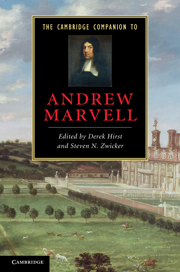Book contents
- Frontmatter
- 1 Introduction
- 2 The social modes of Marvell’s poetry
- 3 Marvell and the literary past
- 4 Borders and transitions in Marvell’s poetry
- 5 Thinking of gender
- 6 Marvell and the designs of art
- 7 Andrew Marvell’s citizenship
- 8 The green Marvell
- 9 A Cromwellian centre?
- 10 The poet’s religion
- 11 Adversarial Marvell
- 12 How to make a biography of Andrew Marvell
- Index
- Cambridge Companions to. . .
8 - The green Marvell
Published online by Cambridge University Press: 28 March 2011
- Frontmatter
- 1 Introduction
- 2 The social modes of Marvell’s poetry
- 3 Marvell and the literary past
- 4 Borders and transitions in Marvell’s poetry
- 5 Thinking of gender
- 6 Marvell and the designs of art
- 7 Andrew Marvell’s citizenship
- 8 The green Marvell
- 9 A Cromwellian centre?
- 10 The poet’s religion
- 11 Adversarial Marvell
- 12 How to make a biography of Andrew Marvell
- Index
- Cambridge Companions to. . .
Summary
To write about nature and the environment in Marvell’s poetry is to risk accusations of simple-mindedness. For nature is rarely – if ever – just nature for Marvell. In the tradition of pastoral poetry, the natural world provides an avenue, with its own rich and highly stylized stock of imagery, for reflecting on wider issues of human life, ranging from love and sexuality through to matters of state. Indeed, in the context of the mid seventeenth century, as other essays in this volume repeatedly remind us, politics infiltrated all poetic kinds, imprinting its own logic and symbolism even upon apparently uncommitted texts. In Marvell’s estate poem Upon Appleton House, To My Lord Fairfax, for example, ‘the tallest oak’, brought down by the ‘feeble stroke’ of a woodpecker, is also King Charles I, executed by the stroke of an axe just a few years before the poem was written (lines 551–2). But sometimes it is worth stating the obvious. While a tree may carry many associations within a poem, there is surely some value to be derived from considering it as a tree. Moreover, there is arguably some cause, given Marvell’s repeated attention to the natural environment, to engage with the insights of the emergent body of ‘eco-criticism’, which is committed to exploring the ways in which ecological discourses shape and inform literary texts.
This approach, like so many others one might take to Marvell, comes hedged with caveats. Marvell is not a programmatic poet. Hence, just as it is notoriously difficult to ascribe coherent political arguments to his works, it is fruitless to try to position him as some kind of pre-modern environmental campaigner. Marvell is much more elusive than that; as Donald M. Friedman states, he is not so much a presenter of arguments as ‘an observer of the process of thought itself’.
- Type
- Chapter
- Information
- The Cambridge Companion to Andrew Marvell , pp. 122 - 139Publisher: Cambridge University PressPrint publication year: 2010
- 2
- Cited by

